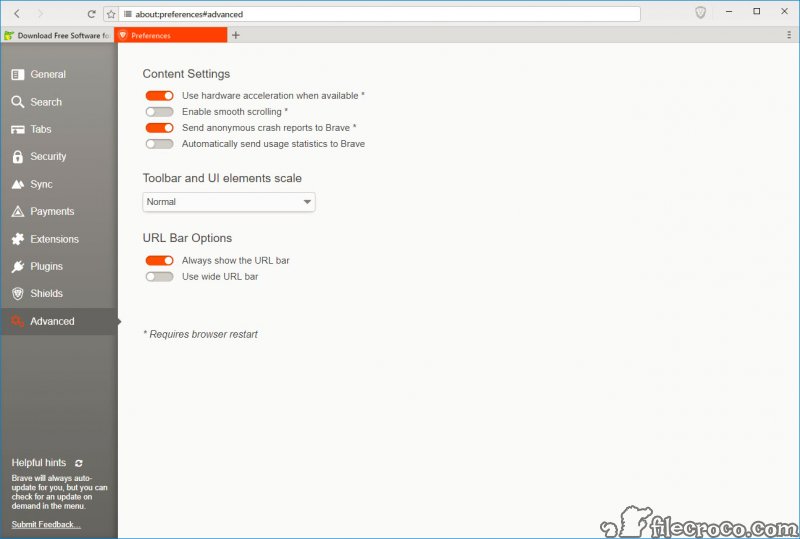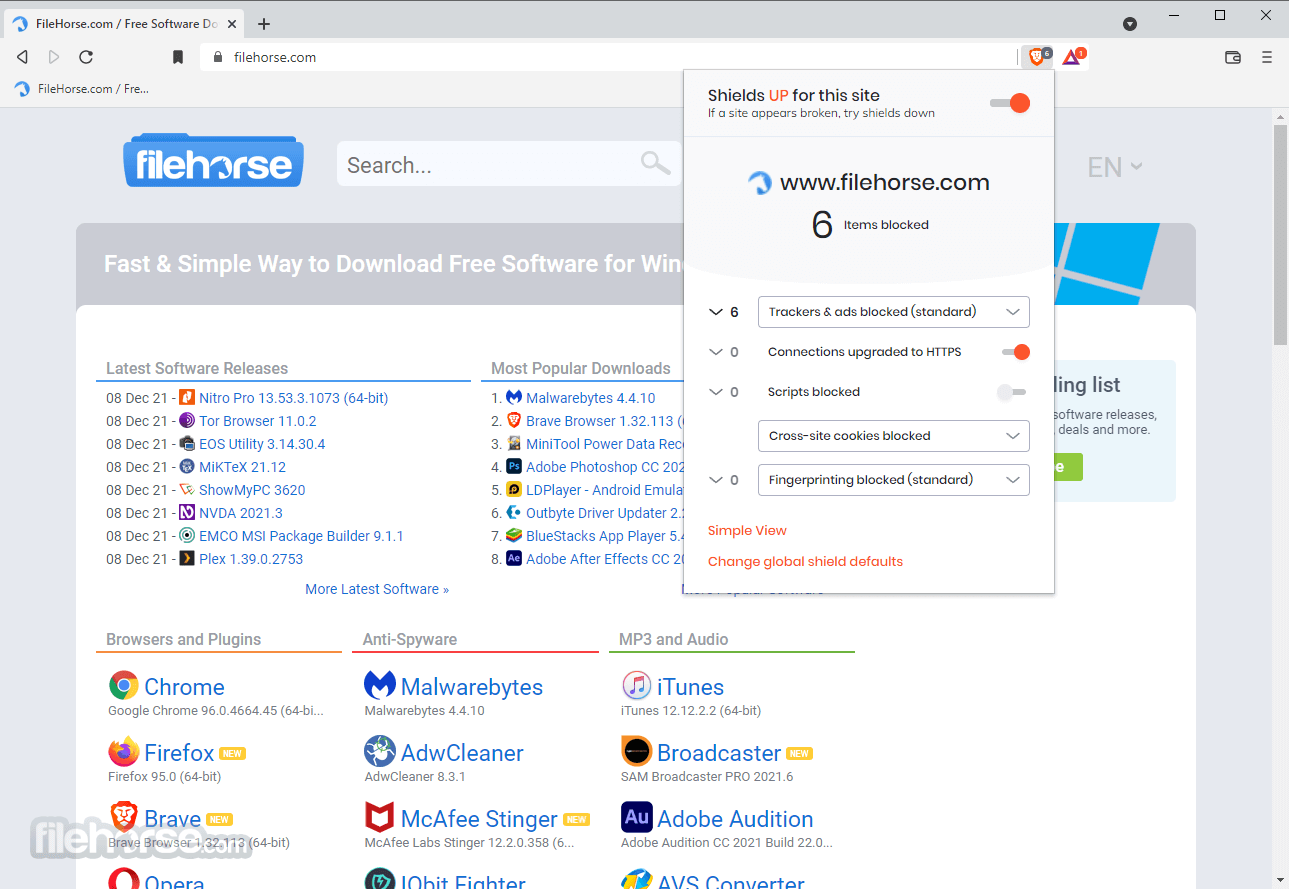Brave is an Internet browser created to prevent trackers, ads and inappropriate content. It does so by sharing less information with online advertisers and ad networks.
The layout and usage of Brave isn't very different from other web browsers like Chrome or Firefox. If you're used to Google Chrome, then Brave is an easy switch as its layout and settings are very similar.

The Brave Browser interface is very simple, and its design makes for a distraction and complication-free browsing experience without elements that crowd websites. Open any website by typing your search in the address bar with this app since it uses Google as a search engine. For Windows especially, despite its flaws, Brave can be a viable Chrome replacement for those who do not want to tweak many settings or deal with installing a lot of extensions. Brave Browser Review Download Brave Final thoughts. There's absolutely no doubt that on the Windows platform, you have many options for browsers.
With the huge increase in different types of ad trackers and sophisticated data collection of large corporations like Google, Facebook and Amazon, it may be necessary to add some privacy protection to your web surfing with browsers like Brave.
Blocking ads and improvement overall privacy while browsing
Brave does many things differently. For one, Brave will prevent advertisements from being displayed in your viewing area, instead opting to move them to different locations.
Brave Browser is optimized for using online shopping and payment services, all of which can be directly configured in the program settings.
As Brave is based on the Chromium project, the same as Google Chrome, Brave is open-source, meaning anybody can obtain the code and inspect it.
In the end, Brave is a pretty good web browser which puts a little bit more thought into user privacy than other browsers.
Brave Browser 1.23.73 on 32-bit and 64-bit PCs
This download is licensed as freeware for the Windows (32-bit and 64-bit) operating system on a laptop or desktop PC from web browsers without restrictions. Brave 1.23.73 is available to all software users as a free download for Windows. As an open source project, you are free to view the source code and distribute this software application freely.
Filed under:- Brave Browser Download
- Freeware Web Browsers
- Open source and GPL software
- Major release: Brave Browser 1.23
- Secure Browsing Software
I'm just going to go ahead and say it:
Edge, the default browser for Windows 10, sucks.
Edge especially sucks for privacy. Yes, even the 'new and improved' Microsoft Edge that is based on the Chromium framework.
It still sucks.
(If you want to dig a little deeper into how much Edge sucks for privacy, then just visit our general Privacy Browsers page.)
But we say whatever to Edge's lack of regard to privacy because there exist a couple of solid privacy focused browser alternatives on the Windows platform.
As with our other recommendation lists, the browsers on this list are not placed in any specific order.
Firefox
Firefox has been around for a long time (do you happen to remember the Netscape days?) so it has evolved with the huge changes brought forward by the modern Internet.
With that, Firefox has always been fast, reliable, secure, and as of more recent times - privacy conscious.
Not to mention that Firefox is one of the last browsers with a big enough market share and development team (Mozilla) that doesn't Star plus episodes online free. run on some fork of Chromium.
Instead, it runs on Mozilla's own Gecko engine.

To get slightly more technical, the Gecko engine is mostly programmed with the C++ and JavaScript languages. With the introduction of Quantum in 2016, Rust was added to this list.
However, it's important to understand that Firefox is not configured for optimal privacy straight from the jump.
You'll need to tweak the right settings, both advanced and basic from with the browser, and download privacy extensions to squeeze the most privacy out of it. Fortunately, doing so isn't hard - it just takes a little bit of time.
Honestly, if privacy and user experience is super important to you when browsing the web (even though you're using Windows 10..), Firefox is absolutely your best bet.
Ungoogled Chromium
To understand Ungoogled Chromium, it's important that you understand Chromium.
Chromium is the open-source engine and framework that the regular Google Chrome is built from.
This does not make Google Chrome totally open-source; it still has proprietary code mixed in with the open-source Chromium.
Most importantly, this also does not make base Chromium a 'private' alternative to Chrome by itself.
Why? Because while base Chromium is not as bad as Chrome, it is still bad for your privacy.
Base Chromium still uses Google web services, which will still transmit some of your data to Google - thus, invading your privacy.
Now, enter Ungoogled Chromium.
Ungoogled Chromium is base Chromium minus Google web services and the other bits of code that periodically calls home to Google.
For example, it removes dependencies on Google Cloud Messaging and Safe Browsing. In the case that Google alters or adds services, Ungoogle Chromium is set up to block internal requests to Google in general.
Ungoogled Chromium also removes the Google-friendly defaults. For example, the default search engine is not set to Google.
It also features several privacy-friendly tweaks that have to be manually enabled.
Ungoogled Chromium is maintained by a small team of developers and anyone who wants to contribute to the code. They're decent in their timing of rolling out zero-day exploit patches to Chrome. Anytone at 7777.
For some people, the one drawback to using Chromium may be that using it contributes to Google's increasing monopolization of the Internet.
While Ungoogled Chromium is arguably more Linux friendly, volunteers do post versions that are compatible with Windows. This comes with its own risks. There is a warning posted on the linked download page.
Pale Moon
Pale Moon is an open-source Firefox fork that has been around for a while. It runs on its own engine, called Goanna, which is forked from Mozilla's Gecko engine.
Unlike many other Firefox forks, Pale Moon is not just a rebranded 'old version of Firefox.'
It did indeed fork from the 2009 code base of Firefox, but it has been maintained and updated by an active team of developers since. (You can reasonably argue that it is its own application now.)

Pale Moon definitely gives an old-school browser vibe that may throw some users off (or make you reminisce about the good ol' days), but it is highly customizable with many themes and add-ons available.
There are many add-ons that help with privacy and security as well; its add-on directory has many options for cleaning up URLs. It even features 'legacy' versions of uBlock Origin and the now undeveloped uMatrix.
Even though Pale Moon is derived from Mozilla code, it does not incorporate the proprietary bits that can be found in Firefox's code.
Additionally, Pale Moon is designed to be fast and light on resources, even for older systems, while maintaining privacy.
The biggest trade off hits when you're faced with more 'advanced' and 'modern' web browser features. For example, Pale Moon does not support WebRTC.
TOR
Tor free, open-source, and a hardened version of Firefox. Its configured to run on the Tor network.
Tor directs your traffic through a worldwide relay, which makes it harder to trace Internet activity to you, the user.
Think of it like an onion (TOR = The Onion Router) the - it adds layers between you and your destination.
This concept was originally - and somewhat surprisingly - introduced by personnel at the U.S. Naval Research Lab (NRL) in the mid-1990s.
The Tor browser is probably the best option for protecting you against invasive fingerprinting practices and from being tracked across the Internet.
It is important to understand that Tor protects your privacy as a user, but it does not hide the fact that you are using Tor.
Because Tor sticks out like a sore thumb, many online services (such as Netflix) can easily detect that you are using Tor (not necessarily that it is you using it) and block you from accessing the site or service.
Additionally, since Tor encrypts and sends your connection request through these relays, download speeds and website loading speeds suffer. And the suffering can be very noticeable.
With that said, Tor is a solid browser for maintaining your privacy, even with some of the drawbacks.
Brave
You may have seen Brave mentioned on other parts of avoidthehack! (ex: in another post, I compared Brave and Firefox Focus.)
Brave launched sometime in 2016 as a project developed by a former Mozilla developer.
Zbrush 4r7 mac crack. It's not a project anymore - it has a full and dedicated development team. It's fully-featured, privacy-focused, and can more-or-less handle the same extensions you can find and install for regular Google Chrome.
Brave is a little different in that it calls its tracker blocking functions 'shields.' These shields block ad and analytics trackers.
Additionally, you can configure it to provide enhanced fingerprint protection and to block all JavaScript. It also has built-in HTTPS everywhere, which will force a secure HTTPs connection to the sites you visit.
It also has an optional ads and rewards program.
Unlike Firefox, Pale Moon and Tor, Brave is based off Chromium, which again, is the open-source framework that Chrome is based on.
Understandably, this might be a cause of concern for some users because of two things:
- Open-source Chromium phones home to Google serves a lot and uses Google web services
and
- Chromium threatens to monopolize the internet.

For the first point, the developers behind Brave have made it 'clear' that 'Brave doesn't participate in Google surveillance'.
Additionally, Brave's code is open-source and available for all to see.
For the second point, there's not much to say - Google's browsing engine monopolizing the internet is a super valid concern, just as it is with Ungoogle Chromium.
Another totally separate and valid concern is that Brave has taken some heat from the privacy community in the recent past - mostly for its opt-in ads and rewards programs.
To some, because of its advertising platform and numerous privacy controversies, Brave may be considered compromised. If you plan to use this browser, please familiarize yourself with Brave's privacy controversies so you can make the best decision for your personal needs.
For Windows especially, despite its flaws, Brave can be a viable Chrome replacement for those who do not want to tweak many settings or deal with installing a lot of extensions.
Final thoughts
There's absolutely no doubt that on the Windows platform, you have many options for browsers.
These options become slightly less when your privacy is your number one concern.
Just like on other platforms, there are many browsers available for Windows that claim to put your privacy first.
The truth is, few actually do.
Brave Browser For Windows 10 Hp
And of those few that are privacy-friendly, you'll more than likely have to make your own adjustments to achieve a level of privacy you are comfortable with.
As I mentioned earlier, your best option for privacy while browsing the Internet is a Firefox that is configured for privacy via its settings and true privacy-respecting extensions.
Brave Browser For Windows 10
As always, stay safe out there!
